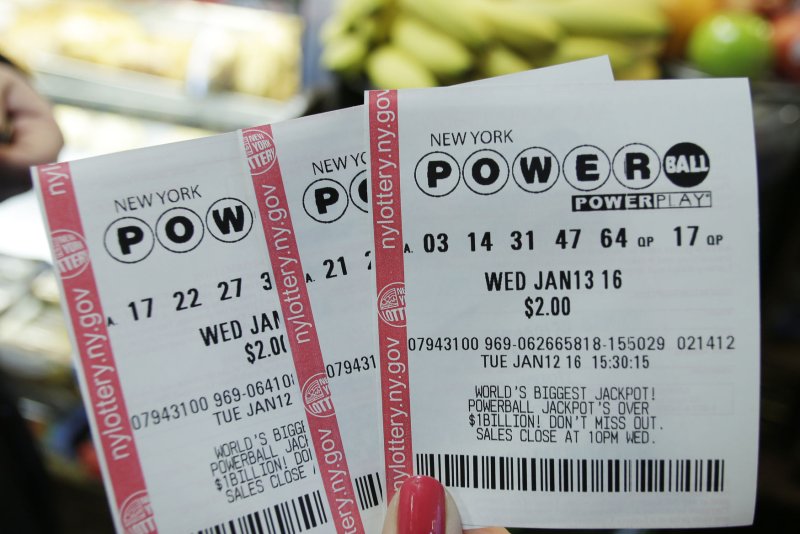Powerball lottery tickets were being sold in the run up to January's historic $1.6 billion Powerball jackpot on New York. While the kitty creeps up past $400 million again, it's worth point out Uncle Sam takes a hefty share of the winnings. File Photo by John Angelillo/UPI |
License Photo
WASHINGTON, May 7 (UPI) -- Though it still pales in comparison to last January's record $1.6 billion Powerball jackpot, the kitty has crept up to an estimated $415 million after no one won the grand prize in Wednesday's drawing.
With the possibility of another big win on Saturday, it's worth pointing out there are several ways people can make a mistake that could end up costing them millions.
For starters, in order to win the full jackpot, Powerball players have to ask for the money in 30 yearly installments, not the lump sum payment. For Saturday's jackpot, the lump sum payout would be $269.7 million, a loss of 35 percent of the total.
Second, there are the taxes. The federal government automatically withholds 25 percent of major lottery payouts. But that's only the start.
The government taxes lotto winnings the same as income, but at the highest income tax rate, 39.6 percent. So if you win the Powerball, not only will a quarter of the pot go directly to the government before the winner ever gets a penny, winners are then responsible for making the rest of the tax payment on the prize -- another 14.6 percent -- when they file their 2017 federal income taxes.
Some states, counties and municipalities also add on their own taxes, which can add up to millions more handed back to the government.
Exempting state and local taxes, NBC News estimates if Powerball has a lone winner of $415 million, they would end up with about $169.2 million in actual cash, that would then be doled out by Powerball with 30 payments over 29 years.
Another common mistake for lottery winners happens if a group of individuals go in on the winning ticket together. Financial experts advise office pools to clearly divide ownership of shared tickets before the drawing happens. That can be done easily by listing participants in the lottery pool and how much each person contributed. (If everyone tossed the same amount, say $10, in the pot, the winning money is divided evenly; if some individuals contribute more than others, they are entitled to a larger percentage of the winnings.)
It might sound obvious, but failing to account for the winning ticket's proper ownership can make for huge legal and tax problems down the road. Office pool or other lotto group organizers should only include the names of individuals who contributed their share before the ticket was purchased, financial experts say.
Including someone who paid afterward or did not pay at all (the "can I pay you on Monday?" coworker) can trigger the federal gift tax, which requires owners of the ticket to pay in order to hand out money to someone who wasn't actually in on the original purchase.
The federal gift tax is a flat 40 percent and kicks in when lotto winners give more than $14,000 to an individual in a given year.
Of course, the odds you'll ever have to worry about it are extraordinarily low -- an individual's chance of winning the Powerball jackpot are 1-in-292.2 million.















